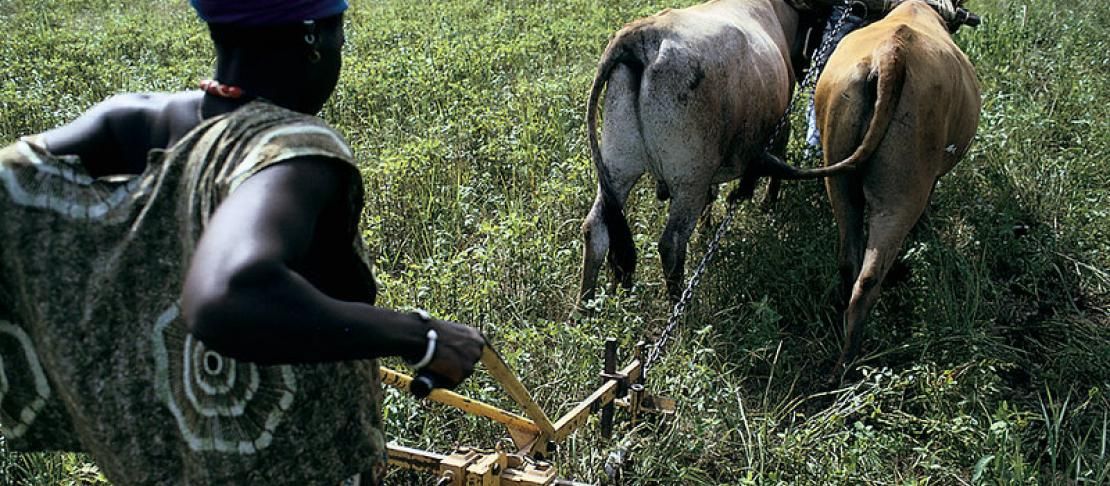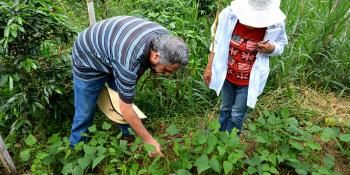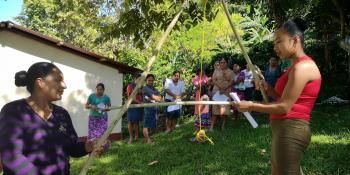Mali, Niger and Senegal: Local stakeholders discuss scaling up climate-smart value chains

Weather and climate conditions cause extreme challenges for smallholder farmers and other actors involved in agricultural value chains in developing countries, particularly in the West African Sahel.
Analyzing existing value chains can help to unravel the complex relationships within a country's agricultural systems, however, the consideration of climate change in that analysis is often lacking. Many initiatives to date have focused on climate in connection to the production part of the value chain, neglecting its importance to the other key stages which relate to harvesting, storage, processing, and taking to market.
Additionally, while much research and development of agricultural technologies has been carried out, scaling those technologies continues to be a challenge.
How to face such challenges?
In response, the CGIAR research program on Climate Change, Agriculture and Food Security (CCAFS) is implementing the project "Development of value chains and climate-smart landscapes to increase resilience in West Africa" in Mali, Niger and Senegal.
The project is happening in collaboration with key agricultural stakeholders - NGOs, producers' organizations, technical services, national agricultural research institute, economic actors, etc., and is made possible thanks to funding from the European Union (EU) and the International Fund for Agricultural Development (IFAD).
The "Value Chain" approach has emerged as a major opportunity for scaling the most promising agricultural innovations. To achieve the objective of building and maintaining the resilience of these value chains, partnership and coordination between national level actors working along the value chains in the three countries has been crucial.
Collaborative partnerships offer opportunities for addressing many of the constraints that arise when it comes to the adoption of climate-smart agriculture along the value chain, and will be a vehicle for the practice of climate-smart agriculture (CSA) technologies at a larger scale.
Inclusion is key
An initial project activity included working with actors and local development stakeholders in the regions of Segou (Mali), Tillaberi (Niger) and Kaffrine (Senegal) to identify priority value chains for the implementation of the Climate Smart Value Chains project.
Through a participatory stakeholder process, the value chains mentioned below were prioritized on the basis of their resilience to the effects of climate change, the percentage of employees working in them, as well as their inclusive value.
- Segou, Mali: rice, millet, goat/sheep, cowpea and market gardening
- Tillaberi, Niger: rice, millet and red meat
- Kaffrine, Senegal: millet/sorghum, groundnuts, goats and non-timber forest products
For each country, these priority value chains were selected for their current and future resilience as well as for their inclusiveness (participation of the poor, women and youth) and the high percentage of people involved.”
Source: Info Note
Collaboration for better results
For a better mainstreaming of climate adaptation strategies along the identified value chains, a second activity was then carried out.
This activity involved establishing platforms to bring the stakeholders from the local sector together for collaborative discussions. Actors were able to combine their knowledge and experience, each with their own specializations and capabilities for adaptations to climate change and the value chain. These communal discussion platforms are spaces not only for learning, but also for change.
For example, the collaborative platform in Mali brought together multiple stakeholders including farmers, the national research institute, traders, food processors, professionals from banks and agents from NGOs.
It emerged from the platform discussions that there is a pressing need to increase knowledge of CSA techniques and practices to improve productivity.
This need was expressed by both producers and seed sellers. Together, taking into account the capabilities of each stakeholder, participants were able to design solutions for specific problems along the priority value chains identified in Segou, Mali.
These platforms are set up by CCAFS to be ongoing discussions focused on production quality, productivity and strategies for taking products to market. Made up of members from across the value chain, they will carry out activities with the aim of developing relevant and applicable solutions based on stakeholder input.
"This process of establishing platforms for the scaling up of innovations in climate-smart value chains has enabled us to provide various actors working along the chain with tools".
Daou Rokia Koné, Regional Director of Agriculture in Ségou
Next steps: practical cases from Climate-Smart Villages
The discussion platforms, which operate according to principles of transparency, have the advantage not only of facilitating the integration of climate-smart agriculture techniques, but also of sharing experiences between the different sectors of activity involved in the value chain process.
By the end of the October 2021, the actors will also have benefitted from capacity building sessions. For example, as mentioned above, platform members from the Mali team voiced a need for capacity building in Climate-Smart Villages (CSV) practices and technologies. In response to this need, a visit to the CSV in Cinzana is planned in September 2021 where members will be introduced to the relevant practices and technologies.
These site visits are unique opportunities for platform members to come into close contact with actual CSA practices in order to apply and scale the impact of climate-smart agriculture.
Since 2019 this initial work has been fostered by the project “Building livelihoods and resilience to climate change in East & West Africa” co-funded by the European Union (EU) and the International Fund for Agricultural Development (IFAD). The project seeks to support large-scale adoption of climate-smart agricultural technologies and practices.



